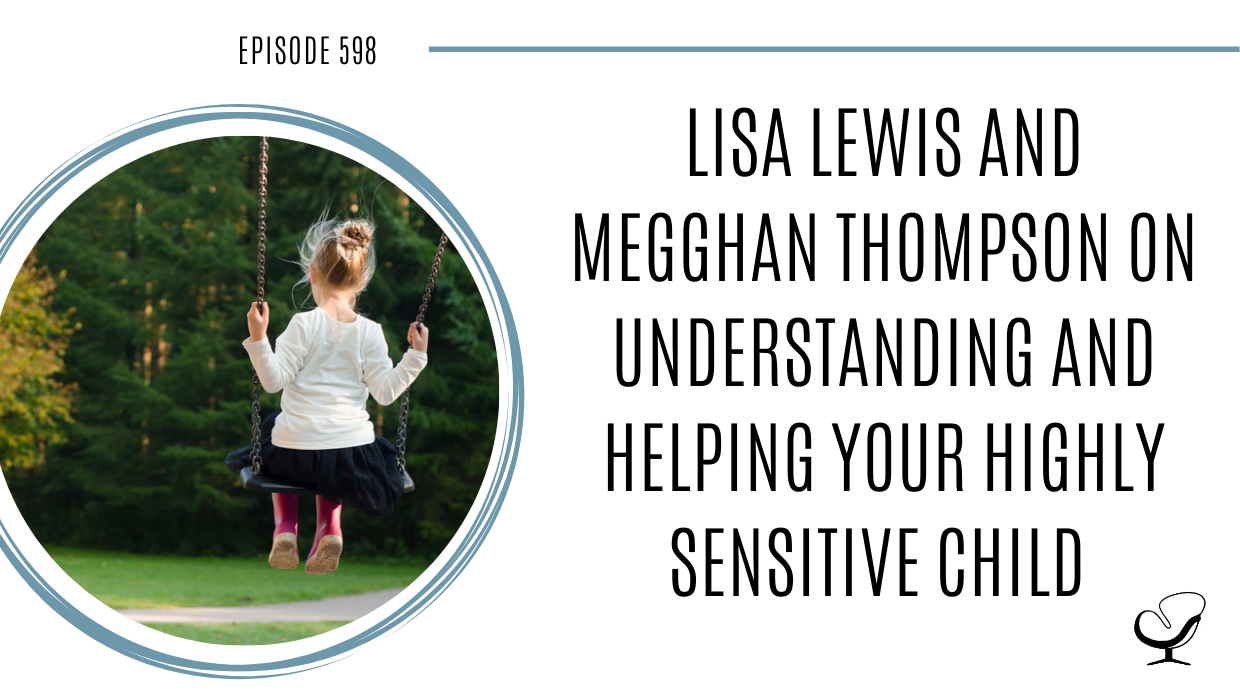Podcast: Play in new window | Download | Embed
Are you caring for a highly sensitive child? Which kinds of traditional parenting strategies do you make use of? How can you teach your highly sensitive child effective coping skills that can support them into their adulthood?
In this reverse podcast episode, Lisa Lewis speaks with Megghan Thompson about understanding and helping your highly sensitive child.
Podcast Sponsor
When you’re in private practice it can be tough to find the time to review your marketing efforts and make improvements where needed.
Whether you are a seasoned clinician whose current website needs to be revamped, or a new therapist building a website for the first time, Brighter Vision is here to help.
By first understanding your practice and what makes it unique, Brighter Vision’s team of developers will create a custom website catered to your specific marketing goals. Better yet, they provide unlimited technical support to make sure it stays updated, and professional search engine optimization to make sure you rank high in online searches – all at no additional cost.
To get started for $100 off, head to brightervision.com/joe.
Meet Megghan Thompson
 Megghan Thompson is a Licensed Clinical Professional Counselor, a Registered Play Therapist-Supervisor and a Parent Coach/Mental Health Consultant. She has been working with Highly Sensitive Children, teens, and their families for over 10 years. She owns a group private practice in Maryland that specializes in working with HSCs, HS teens, and young adult HSPs who engage in life-threatening behaviors like daily meltdowns, aggression, suicidal actions, promiscuity, and self-harm.
Megghan Thompson is a Licensed Clinical Professional Counselor, a Registered Play Therapist-Supervisor and a Parent Coach/Mental Health Consultant. She has been working with Highly Sensitive Children, teens, and their families for over 10 years. She owns a group private practice in Maryland that specializes in working with HSCs, HS teens, and young adult HSPs who engage in life-threatening behaviors like daily meltdowns, aggression, suicidal actions, promiscuity, and self-harm.
Megghan’s mission is to defeat the statistic that HSPs make up 50% of the population that seeks therapy but only make up 20% of the population. She’s doing this by building an army of parents equipped with the support and accountability to rapidly transform their relationships with their children.
She helps parents of highly sensitive children and teens eliminate the daily meltdown/shutdown cycle in as little as 8 weeks through her coaching program.
Visit her website and connect on Facebook and Instagram. Subscribe to her Youtube Channel.
Check out the free training for parents and for parents of teens.
In This Podcast
- How is traditional parenting ineffective for highly sensitive children?
- Teaching children effective coping skills
- How do highly sensitive young people develop mental disorders?
How is traditional parenting ineffective for highly sensitive children?
In broad terms, traditional parenting teaches kids that they are right or wrong based on their behavior, and sensitive kids are uniquely available to understand how their actions impact other people, and so when a parent uses a traditional parenting strategy like time-outs … or corporal punishment … the message that the [highly-sensitive] child receives is “you’re wrong” and “your actions are a definition of who you are”. (Megghan Thompson)
Traditional parenting, due to its black and white nature, can push a highly sensitive child into a space of shame because traditional parenting does not discipline or nurture a highly sensitive child accurately.
This is because traditional parenting strategies are shame-based. Parents who are using these strategies are not intending to shame their child, however, the strategy itself perpetuates the shame.
In this way, a harmful cycle is created where the child tries to hold in their high sensitivity to not be punished, but inevitably explodes, and is punished in shame, all the same, leading them to try to bottle it up again, and the cycle continuing.
Teaching children effective coping skills
Most coping skills that parents teach their children are centered around a “fix-it” attitude where something is specifically wrong and needs to be rightened, similar to black and white thinking.
With highly sensitive children, there needs to be a grey area where parents can support their children while they experience the big I wanted to speak about that component that parents can experience which is just trying to find the right coping skill for their child, and I really encourage parents to zoom out and notice if there are other factors that are playing into your child’s ability, rather than seeing “oh, deep breaths don’t work” or … “my child won’t be able to calm themselves down”. (Megghan Thompson)
Observe whether there are other factors at play in your child’s tantrum or even in their ability to calm down.
There are many different options to try, and it is up to you as the parent to guide and soothe them to finding what works for them, because overall, they are the child in this situation.
When we think about trying to teach our children how to regulate their emotions, it’s not just about talking to them about what they can do better [or] differently next time. It’s about maintaining your relationship, and shifting so that they feel understood. (Megghan Thompson)
Take some time to evaluate how your parents raised you – are you replicating their methods? Do those methods resonate with your children?
It is easy for people to take the automatic route; however, it may be best for your child – and even to you as the parent – to explore different ways of parenting that help encourage you and your child to feel heard, seen, loved, and respected.
How do highly sensitive young people develop mental disorders?
New research has shown that highly sensitive people who grow up in an invalidating environment are more likely to develop mental disorders, and much more likely to develop self-harming behaviors.
Numerous studies have shown that a clear path is set up to self-harming behaviors or the diagnosis of mental disorders when highly sensitive children or teenagers experience trauma in an invalidating environment.
As these children grow into adults, there is an experience gap in their ability to set boundaries that grows larger with time, until they seek help and learn to close that space.
Highly sensitive people are capable and able, thoroughly, of naming their boundaries, and when you can’t trust your gut because you weren’t taught to trust it as a child, there’s a significant uphill battle learning how to do that and that’s where a skill gap comes in. (Megghan Thompson)
Teaching young people who are highly sensitive to fill their skill gap is how you can support them to be autonomous, and self-regulating, and to know that they are fully capable and stable.
It is important to view high sensitivity as a strength, not as a difficulty. It is about looking for ways to support highly sensitive people to flourish and create an environment. So that they can stretch their boundaries to set stronger boundaries.
Useful Links mentioned in this episode:
- National Suicide Prevention Hotline: 1-800-273-8255
- Crisis Text Line: Text HOME To 741741
- Rate, review, and subscribe to the Am I OK? Podcast on Apple Podcasts, Stitcher, Google Podcasts, TuneIn, Audible/Amazon, and Spotify.
Check out these additional resources:
- Talking About Money with Mark Butler | POP 597
- Starting a private practice? Get this free 28 step checklist
- Sign up for Next Level Practice
- Events – click on the event’s dropdown
- Sign up to join the free webinars and events here
- Podcast Launch School
- Practice of the Practice Podcast Network
- Free resources to help you start, grow, and scale
- Apply to work with us
 Meet Lisa Lewis
Meet Lisa Lewis
With three certificates in energy healing and Level 2, Reiki certified, Lisa has gained extensive training in the mind-body connection. She also has the traditional training of a Master’s degree in Marriage and Family Therapy. Together she offers clients a holistic approach during sessions. Dedicated to her private practice and work in her community, Lisa sees patients in her Pasadena, California office. As well as virtually in online therapy or phone therapy.
She has a keen interest in helping those who struggle with issues related to being a highly sensitive person. As well as parents and individuals navigating through depression, anxiety, stress, or trauma. Lisa has over 20 years of education, training, and life experience, Lisa is well-equipped to help others in their healing and personal growth.
Visit her website. Connect on Instagram, Facebook, and Pinterest. Listen to her podcast and sign up for her free course.
Get in touch with Lisa at [email protected] or call her for an initial consult at 626.319.5076.
Thanks For Listening!
Feel free to leave a comment below. Share this podcast on social media by clicking on one of the social media links below! Alternatively, leave a review on iTunes and subscribe!


